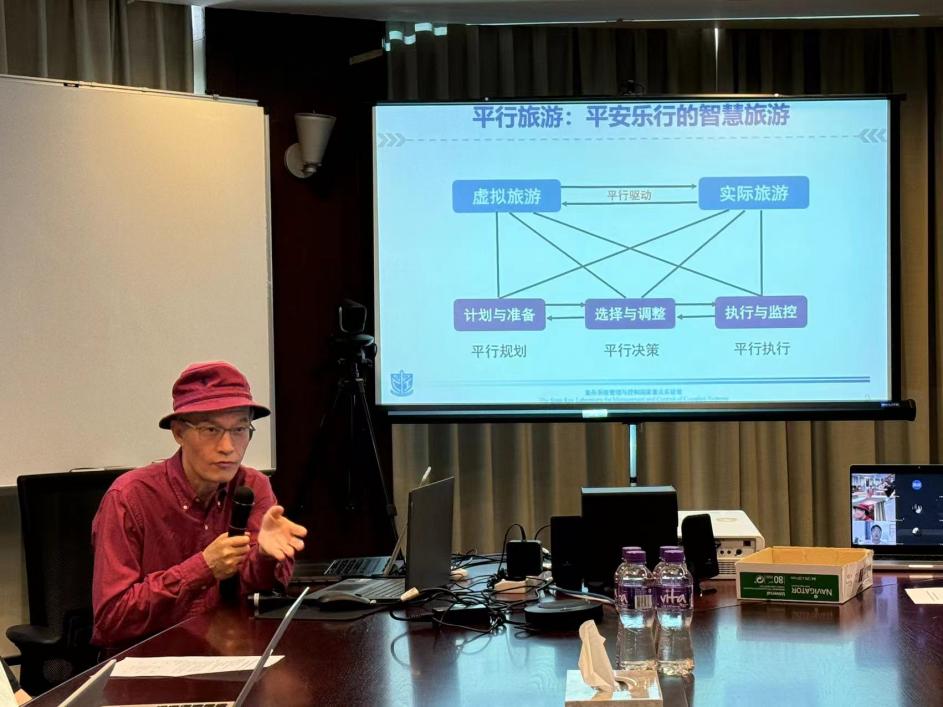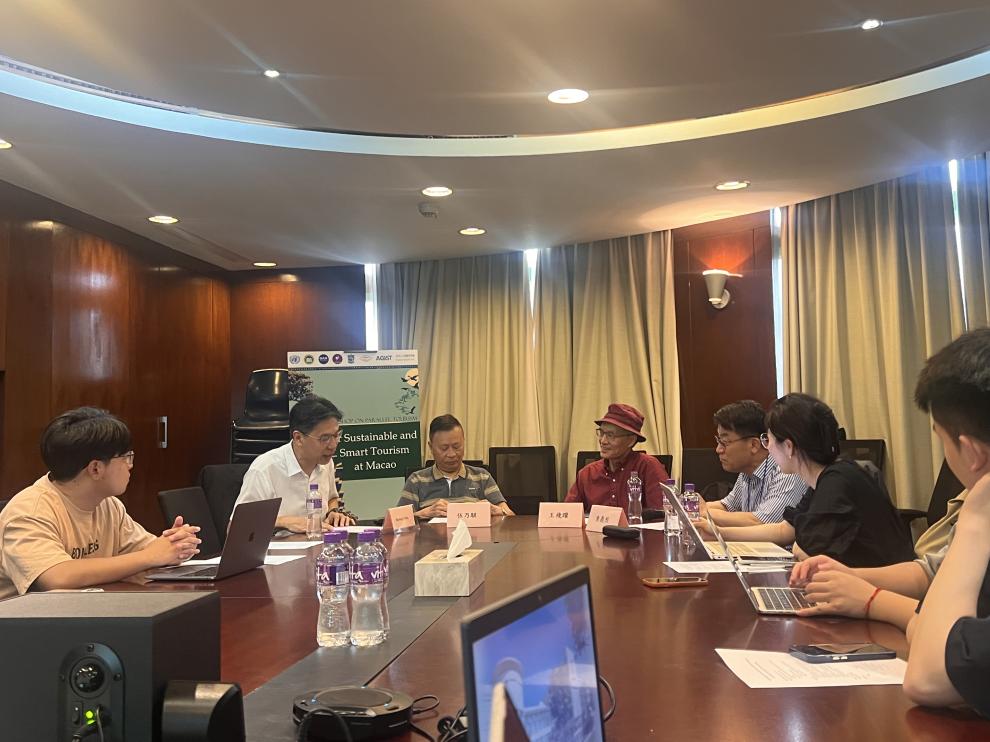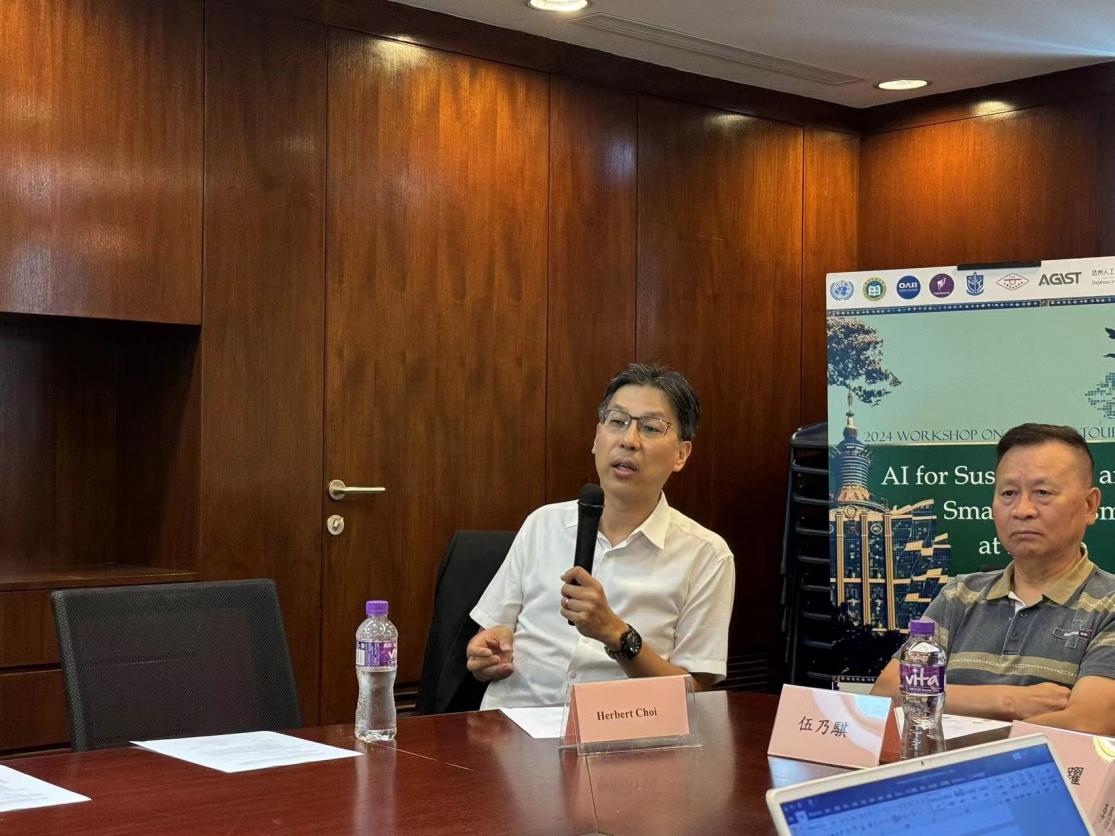The "2024 Workshop on Parallel Tourism: Artificial Intelligence for Sustainable and Smart Tourism at Macau" was successfully held on June 22, 2024, in Macau, the workshop was jointly organized by the Macau University of Science and Technology and the Dazhou Institute of Artificial Intelligence, with the aim of exploring how intelligent technologies can drive innovation and upgrading in the tourism industry.
Distinguished Guest Professor Wang Feiyue from the Department of Engineering Science, Faculty of Innovation Engineering at Macau University of Science and Technology delivered a keynote speech titled "A Large Model for Intelligent Tourism and Life Services in Macau Based on Multi-source Knowledge Bases and Distributed Communities," analyzing in depth the construction and application of intelligent tourism service systems and providing theoretical and practical guidance for technological innovation in the tourism industry. This event attracted over 30 specialists and scholars from the Macau University of Science and Technology, the Macao Government Tourism Office, the Institute of Automation Chinese Academy of Sciences, the University of California Los Angeles, and the Sichuan University of Arts and Science. Participants discussed hot topics such as smart tourism, parallel tourism, travel metaverse, as well as the basic intelligence applications in travel through a combination of online and offline platforms.

Distinguished Guest Professor Wang Feiyue delivered a keynote speech
Artificial intelligence (AI) has exerted a significant influence across multiple sectors, encompassing education, technology, and commerce. Among these, large language models of ChatGPT have improved language teaching efficiency while also driving innovation in teaching content and methods. In the tourism industry, the application of AI is not only improving service efficiency and creating personalized experiences but also demonstrating great potential in optimizing the market analysis and operations management.
The 2024 Workshop on Parallel Tourism was held in Macau, focusing on cutting-edge topics such as smart tourism, parallel tourism, and tourism metaverse. Distinguished Guest Professor Wang Feiyue gave a presentation at the conference, delving into the challenges and opportunities facing the tourism industry from both technical and theoretical perspectives, he demonstrated the application of AI in promoting the development of the tourism industry, particularly in the area of smart tourism. He emphasized that the sustainable development of smart tourism depends on the two-wheel drive of "hard technology" and "soft technology," namely intelligent unmanned autonomous systems and blockchain-based federated intelligence. Regarding the future of the tourism ecosystem, Professor Wang proposed the theory of "three worlds and three humans": robots, digital humans, and biological humans will engage in the tourism industry, with digital humans serving as the dominant force in service and handling numerous of daily tasks; biological humans will concentrate on dealing with emergencies or work that machine cannot be tackled, forming a complementary collaborative working mode. Moreover, he stated that the smart tourism platform based on basic intelligence will become a future trend in the industry, not only improving tourists' experiences but also promoting the green transformation and efficient management of the tourism industry, laying a solid foundation for achieving long-term prosperity of the tourism economy. This discussion sparked strong resonance among specialists, reflecting the academic community's high enthusiasm and expectations for integrating AI into the tourism industry.

Discussion
During the workshop, Mr. Choi Cheong Hong, Head of the Information Technology Division of the Macau Government Tourism Office, highly commended Distinguished Guest Professor Wang Feiyue for his insightful analysis and perspective on the application of artificial intelligence in the tourism industry. Mr. Choi specifically pointed out that Professor Wang's excellent talk not only highlighted the huge potential of smart tourism but also showcased optimizing tourist travel experiences by utilizing advanced data analysis, customer behavior forecasting, decentralized autonomous organizations, and retrieval-enhanced generation. Additionally, Chair Professor Wu Naiqi, Head of the Department of Engineering and Science, Faculty of Innovation Engineering at the Macau University of Science and Technology, and Professor Lee Jeong Lyeol, Vice Dean of the Faculty of Hospitality and Tourism Management at Macau University of Science and Technology, expressed the perspectives and optimism about the future development of smart tourism. They emphasized the core role of artificial intelligence and big data technology in reshaping modern tourism and envisioned how these technologies would further enhance tourism experiences, improve operational efficiency, and promote sustainable development in the tourism industry.

Mr. Choi Cheong Hong, Head of the Information Technology Division of the Macau Government Tourism Office delivered a speech
The discussion effectively showcased the core role of artificial intelligence in promoting the tourism industry in a more intelligent and sustainable direction. Professor Wang delivered a forward-looking analysis of smart tourism and insightful observations about the industry, highlighting the immense potential of intelligent technology in shaping the future tourism experience and optimizing operational efficiency. The discussions not only deepened the participants' understanding of the inherent value and future trends of smart tourism but also highlighted Macau as the key role in the field of global smart tourism.
Macau is a vibrant city, and will become a model and pioneer leading the global tourism industry into a new era of intelligence and sustainability.





